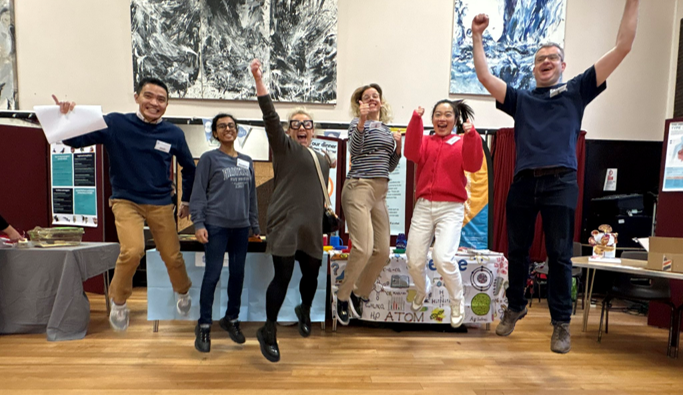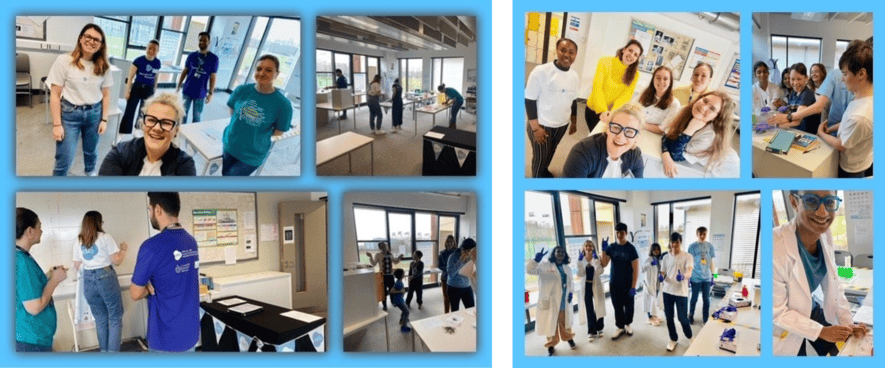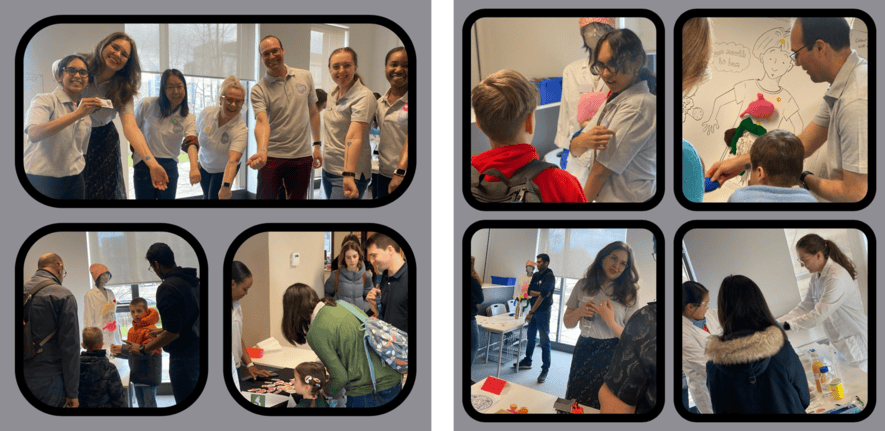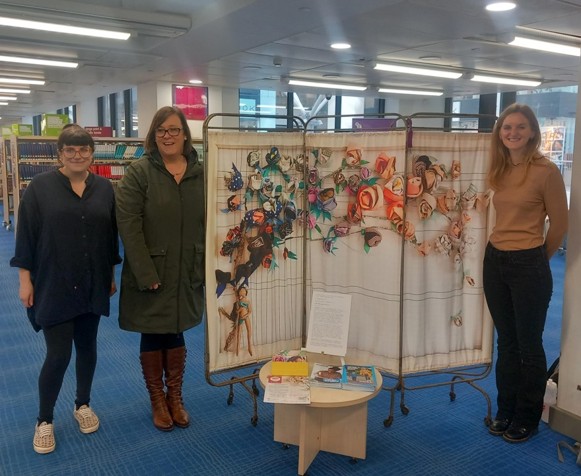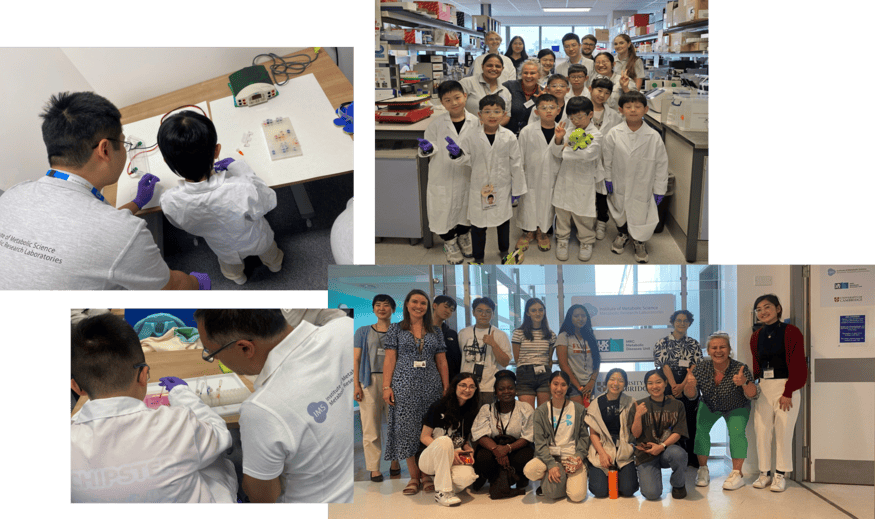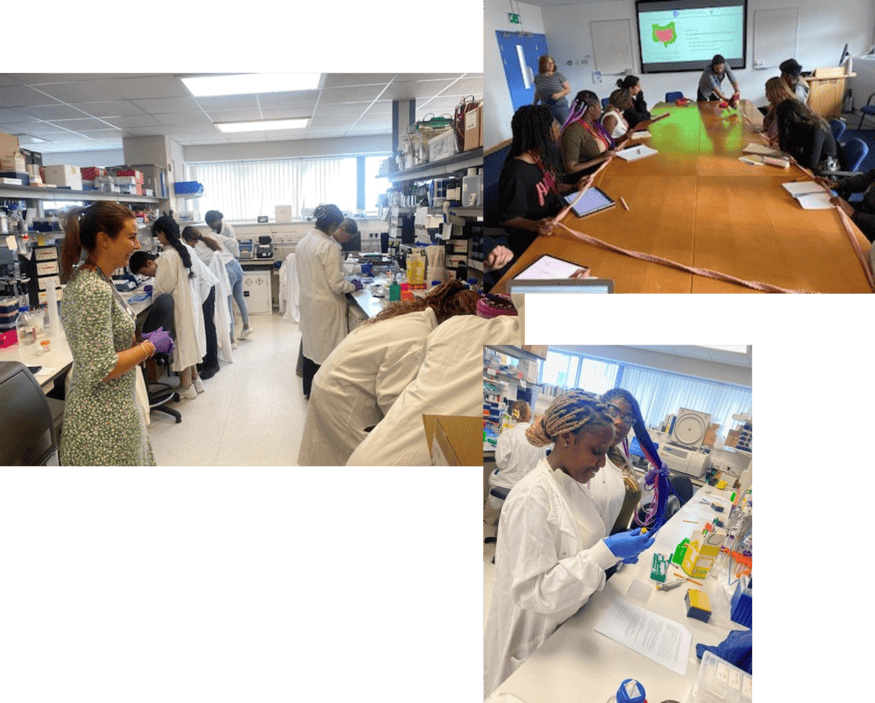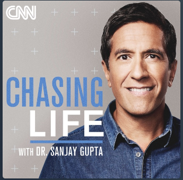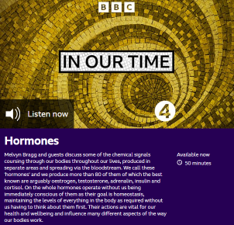Why is Patient and Public Involvement and Engagement important at the IMS-MRL?
- Builds Trust and Value: We want our research to be trusted and valued by all, fostering public confidence in our discoveries and their impact on society.
- Enhances Relevance: By involving public and patient groups in our research process, we gain insight into their priorities, ensuring our work remains meaningful and responsive to real-world needs.
- Inspires Future Generations: Through direct engagement, we strive to spark curiosity and inspire children and young people, encouraging the next generation to explore careers in science and health.
How does the IMS-MRL support Engagement and Involvement?
- Training and Resources: We equip our researchers with the tools needed for effective engagement and involvement, providing training, successful examples, and a variety of outreach opportunities.
- Inclusive Participation: From students to Professors, many IMS-MRL researchers are committed to engaging with the public, creating a culture where knowledge-sharing and involvement are encouraged at all levels.
The impact of Engagement and Involvement at the IMS-MRL
- Feedback for Relevance: Meaningful engagement and involvement with the public generates valuable feedback, helping us keep our research aligned with public needs and reminding us of the impact behind our work.
We also work closely with the UKRI Public Engagement team and University of Cambridge Public Engagement.
Follow the sections below for more about our activities
Cambridge Festival
You will always find us at the Cambridge Festival giving public talks and taking part in events aimed at children and the young at heart, and the vast majority of events are completely FREE to attend! The Festival gives members of the public the opportunity to explore the amazing variety of research being done across Cambridge. IMS-MRL scientists get involved each year, giving talks or running activities that relate to their research.
Big Biology Day
We also take part in the Cambridge Big Biology Day which is a one-day science festival, hosted by Hills Road Sixth Form College, and is open to all. The event celebrates the life sciences through hands-on activities, crafts and displays, bringing together a number of biological organisations under one roof.
More events
We enjoy taking our activities to other fun public events.
Art and Science Coming Together
In 2022/2023 we took part in an Art for Change through Engagement (ACE) project in a collaboration with the Cambridge School of Art at Anglia Ruskin University. PhD student Danielle Jones worked with Amanda Lavis from the Cambridge School of Art and members of a Public and Patient Involvement Panel to create ‘art’ with a focus on a metabolic disease or condition studied at the IMS-MRL and people’s experiences of it. Working with pregnant women, mothers and family members from black and south Asian groups at the Rosie Maternity Hospital they developed a textile installation which symbolised their culture - a rose bush to resemble the hospital, the essence of a mother growing and developing through pregnancy, and also the community of people it takes to nurture a baby.
In addition to festivals we have worked with our colleagues in the MRC Epidemiology Unit to deliver a range of activities in local schools and at community events organised by the Cambridge City Council Children and Young People’s Participation Service and the North Cambridge Community Partnership.
We sometimes arrange to host young people from schools at the Institute, from both the UK and further afield including children from Hong Kong for our Big Bang event and students from Japan for a workshop.
Please note however, that we have limited capacity to work in partnership with schools and young people’s and prioritise under-served young people such as those from lower socio-economic groups, rural areas or places where HE uptake is low. If you’d like to get in touch please contact Agnes Lukasik.
Aspiring Scientists Training Programme (ASTP)
We also offer work experience for sixth form students through a collaboration with The Gurdon Institute in Cambridge. The Aspiring Scientists Training Programme (ASTP) is designed to give A-level biology students a chance to experience what a career as a biologist entails, from bespoke workshops with experts in the sector, to networking opportunities with scientists and the chance to explore life at a world-renowned research university.
Several areas of IMS-MRL research are often in the news so we are frequently asked by TV, radio and newspapers for comments or expert opinions. Engaging with local, national and international media is an important way to help keep citizens informed on the latest research. We are also lucky to have several researchers who especially enjoy working with news outlets and using other channels and social media.
Here are some examples:
In the papers
In 2019, a study led by the Farooqi group attracted international coverage. 'Thin people are that way due to genes' is an ITV News story with Professor Sadaf Farooqi.
On TV and Radio
|
Professor Giles Yeo talking to Dr Sanjay Gupta about why some people are genetically predisposed to eat more |
Prof Sadaf Farooqi talking on BBC’s "In Our Time" on the chemical signals that course through our bodies throughout our lives - hormones |
Prof Stephen O’Rahilly discusses Hyperemesis Gravidarum – a severe form of pregnancy sickness |
Other channels
Find more films and podcasts featuring researchers from the IMS-MRL on our watch and listen page and on our YouTube channel.
Why Public and Patient Involvement (PPI) is essential for science and society at the IMS-MRL
What is PPI at the IMS-MRL?
- Definition: Public and Patient Involvement (PPI) at the Institute of Metabolic Science – Metabolic Research Laboratories (IMS-MRL) is about actively involving patients, caregivers, and the public in shaping our research that addresses global metabolic health challenges.
- Mission: Through PPI, the IMS-MRL aims to build meaningful connections with the public to drive research that is relevant, impactful, and rooted in real-world needs.
Why is PPI important for science at the IMS-MRL?
- Enhances the relevance of our research: PPI helps IMS-MRL researchers ask questions that address real patient and public concerns about metabolic diseases, such as obesity, diabetes, and cardiovascular conditions.
- Improves research quality: Diverse insights improve study design, leading to more relevant, comprehensive, and applicable findings that directly benefit the public.
- Increases funding success: Public engagement strengthens grant proposals by demonstrating to funders that our research aligns with the priorities of our key stakeholders.
- Supports ethical research: PPI ensures research at the IMS-MRL is respectful, inclusive, and grounded in patient and community needs.
Why is PPI important for patients and the wider public?
- Empowers individuals: Being involved gives patients and their families a voice in shaping research that impacts their health and well-being.
- Builds trust in science: By fostering transparency, PPI strengthens public understanding of our mission and builds trust in our findings.
- Increases awareness and education: PPI enables the public to engage with cutting-edge metabolic science, promoting scientific literacy and awareness of key health issues.
- Improves health outcomes: Research that reflects patient input leads to treatments and recommendations that are practical and effective.
Success Stories of PPI at the IMS-MRL
- Collaborative clinical trials: PPI involvement at the IMS-MRL has made trials more accessible and patient-centred, improving recruitment and retention.
- Raising disease awareness: Through patient and public engagement, the IMS-MRL has amplified awareness of metabolic health issues and driven research on underrepresented conditions.
Testimonial
"At the IMS-MRL, involving patients and the public is not just a courtesy—it’s fundamental to achieving impactful, meaningful science."
How to get involved
Become part of a research advisory group, participate in public events, or share your insights with us. Together, we can shape a healthier future.
Get in touch with Agnes Lukasik, our PPIE Manager

